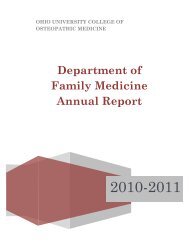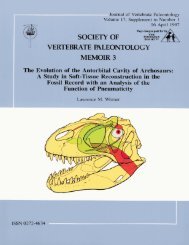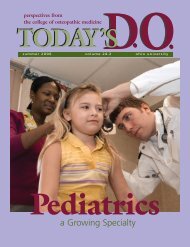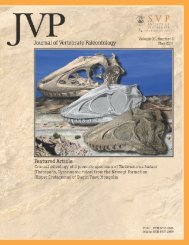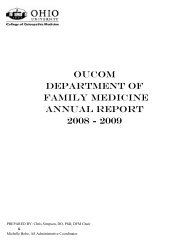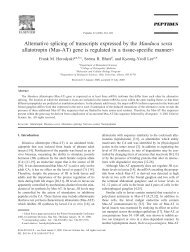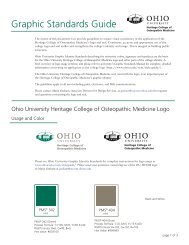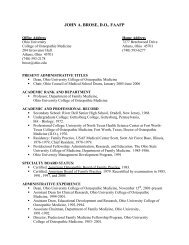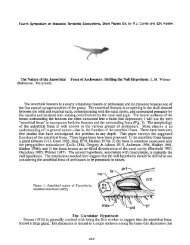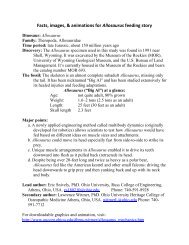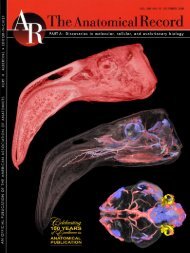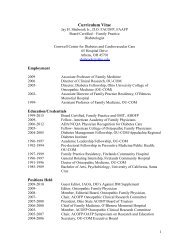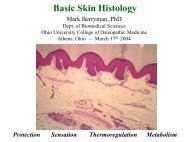DO - Ohio University College of Osteopathic Medicine
DO - Ohio University College of Osteopathic Medicine
DO - Ohio University College of Osteopathic Medicine
Create successful ePaper yourself
Turn your PDF publications into a flip-book with our unique Google optimized e-Paper software.
lth<br />
eriences that<br />
<strong>of</strong> potential differences,” Horwitz says. “This is a good way<br />
to learn to interact with patients from different backgrounds<br />
within different health-care systems.”<br />
For example, students participating in the geriatric tutorial in<br />
Edinburgh <strong>of</strong>ten note how differently the United Kingdom<br />
rations care for its elderly. According to Ice, American doctors<br />
more <strong>of</strong>ten take extreme and intensive measures with elderly<br />
patients than do English doctors.<br />
Ice, herself, studied in the U.K. at the London <strong>University</strong><br />
while still a junior at Washington <strong>University</strong>. At the time, she<br />
majored in anthropology and worked in nursing homes on<br />
the side. Later, for her doctoral dissertation in gerontology at<br />
the <strong>University</strong> <strong>of</strong> Minnesota, Ice conducted research on the<br />
stress levels <strong>of</strong> U.S. nursing home populations.<br />
A few years after coming to OU-COM, Ice decided to diversify<br />
her research. “I was aware <strong>of</strong> the HIV epidemic in Africa<br />
and that many grandparents <strong>of</strong> orphans have unexpectedly<br />
become caregivers again,” she says. “I started thinking about<br />
the potential for stress there.”<br />
She headed to Kenya for the first time in 2002, to establish<br />
the Kenyan Grandparents Study, which examines how<br />
unanticipated childcare responsibilities affect the stress levels,<br />
nutrition and health <strong>of</strong> the elderly. What’s more, she fell in<br />
love with the place, and she’s returned every summer since<br />
with students in tow.<br />
“There are many situations in Kenya that will frustrate you or<br />
break your heart, but it’s amazing how much people appreciate<br />
the little things you do for them,” Ice says. “I always learn<br />
something new about myself and about Kenya. ... It’s neat<br />
to watch students go through the same process.”<br />
Even if students never return to the country where they studied<br />
or treat a tropical disease as physicians in the U.S., Ice believes<br />
international experience inspires better physicians.<br />
“Culture permeates everything,” she says. “We are an immigrant<br />
country, and immigrants arrive with their own attitudes, diseases<br />
and customs. It helps to be aware <strong>of</strong> all <strong>of</strong> those factors.”<br />
TODAY’S<br />
<strong>DO</strong><br />
Charles J. Cannon Edinburgh Geriatric Tutorial<br />
This clinical and educational program gives third-year medical<br />
students an opportunity to experience health care for the<br />
elderly in Scotland’s National Health Service.<br />
Deborah Meyer, Ph.D., director, 740.593.2266<br />
meyerd1@ohio.edu<br />
Community-Based Tropical Disease Research-Ecuador<br />
With a focus on Triatominae insects and mosquitoes in domestic,<br />
peridomestic and sylvatic habitats, this program seeks to<br />
reduce the spread <strong>of</strong> Chagas disease in Ecuador. Community<br />
education activities, including the production <strong>of</strong> educational<br />
tools to be used in the region, are also an important part <strong>of</strong><br />
this project.<br />
Mario Grijalva, Ph.D., director, 740.593.2192<br />
grijalva@ohio.edu<br />
Introduction to the Galapagos Islands Natural History<br />
This program provides an introduction to one <strong>of</strong> the most sensitive<br />
ecological habitats in the world. By visiting uninhabited<br />
and inhabited islands, students have a chance to compare and<br />
evaluate the impact <strong>of</strong> human activities on the island ecosystems<br />
and to discuss the struggle between economic development<br />
and conservation.<br />
Mario Grijalva, Ph.D., director, 740.593.2192<br />
grijalva@ohio.edu<br />
Tropical Disease Biology Workshop in Ecuador<br />
The objective <strong>of</strong> this multidisciplinary adventure is to gain a<br />
deeper understanding <strong>of</strong> the complex factors that play a role<br />
in the biology <strong>of</strong> tropical diseases.<br />
Mario Grijalva, Ph.D., director, 740.593.2192<br />
grijalva@ohio.edu<br />
Kenyan Grandparents Study<br />
This research project seeks to examine the effect that caregiving<br />
for orphaned children has on the health and wellbeing<br />
<strong>of</strong> Luo elders.<br />
Gillian Ice, Ph.D., M.P.H., director, 740.593.2128<br />
iceg@ohio.edu<br />
SHARE Kenya-<strong>Ohio</strong><br />
In this clinical program, students, faculty and clinicians deliver<br />
health care to residents in rural western Kenya.<br />
Christopher Simpson, D.O., M.A., director, 740.593.2257<br />
simpson@ohio.edu<br />
Village Mountain Mission<br />
This clinical program provides health care to the people <strong>of</strong><br />
Pueblo Nuevo, Dominican Republic. Identification <strong>of</strong> specific<br />
health conditions, for which there may be some immediate<br />
strategies, as well as those that require long-term strategies<br />
are an important part <strong>of</strong> this program.<br />
Roy Bontrager, M.D., director, 740.593.2207<br />
rbon@hocking.net<br />
<strong>Ohio</strong> <strong>University</strong> and CEDEINFA Partnership:<br />
Medical care for the “poorest <strong>of</strong> the poor” in San Salvador<br />
provides care for children and their families in collaboration<br />
with the Center for the Complete Development <strong>of</strong> Children and<br />
their Families.<br />
Eddith Dashiell, Ph.D., director, 740.593.2581<br />
dashiell@ohio.edu<br />
Clinical rotation in Ecuador<br />
This program provides students with an opportunity to rotate<br />
for four weeks in a variety <strong>of</strong> disciplines in select hospitals<br />
in Quito, Ecuador. Students will take orientation and training<br />
at Catholic <strong>University</strong> <strong>of</strong> Ecuador, receive classes in medical<br />
Spanish and conduct clinical rotations in the different services<br />
<strong>of</strong>fered by the participating hospitals.<br />
David Drozek, D.O., Ph.D., director, 740.593.2489<br />
drozek@oucom.ohiou.edu<br />
summer/fall 2007 19



